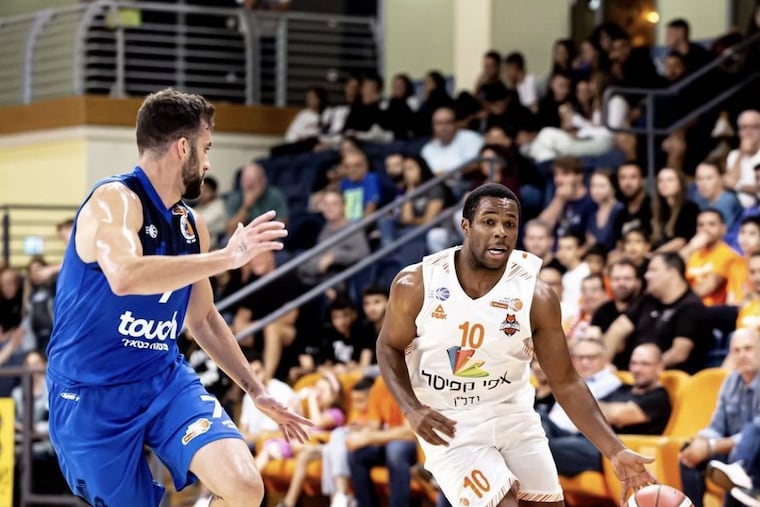Jared Armstrong had to flee his dream job playing basketball in Israel
“We were in the living room trying to figure out what we were going to do,” Armstrong said. “We’ve got to do something. We don’t have no guns. If they come, we’re dead.”

Jared Armstrong understood there were risks. A pro basketball player from the Logan section of Philadelphia, Armstrong has been living what he described not as a dream, but a fulfillment of his vision, the sport as his job, exactly where he wanted to be in Israel.
His mother is Jewish, and Armstrong said he was raised in the faith. He fought for Israeli citizenship.
“It means everything to me,” Armstrong said this week about playing in Israel. “It’s my homeland. It’s my second home. I kind of rush back to Israel.”
He’s back in his first home now. There is no professional league play in Israel. “Everything is uncertain,” Armstrong said.
In peaceful times, playing for Elizur Ashkelon in the Israeli second division was ideal, Ashkelon right on the Mediterranean coast. On Oct. 7, that all changed. The 27-year-old was woken up around 6:30 a.m. by a call from his coach.
“Listen, stay in your safe room,” Armstrong was told. “Get whatever you need [from the kitchen], then stay in there.”
Rockets had started firing.
“I live about 20 minutes from Gaza,” Armstrong explained.
His bedroom doubled as a shelter, “like a safe room,” Armstrong said. He figured he stayed in there for maybe two or three hours. He could access news reports, so he saw reports of villages not far away being attacked by Hamas terrorists. He looked up the distances. One village was 21 kilometers away. He met with teammates living in the same building.
“We were in the living room trying to figure out what we were going to do,” Armstrong said. “We’ve got to do something. We don’t have no guns. If they come, we’re dead.”
They decided as a group, Armstrong said, to make a run for it, to try and drive up toward Tel Aviv.
“If they get us on the road, that’s our fate,” Armstrong said of the collective thought. “If they kill us, they kill us. At least we have a chance to get away.”
They drove through about five Israeli checkpoints before reaching Tel Aviv, where they went to a friend’s house.
“We had to stop at a grocery store,” Armstrong said. “I remember a police officer saying, ‘Where are you guys going?’”
They explained themselves.
“Man, listen, stay in the house, don’t come outside,” the police officer said.
They followed that advice.
“That was our life for five or six days,” Armstrong said.
He followed the United States government’s directive for Americans to leave if they could, and got a flight out. He’d been told the league is going to try to be up and running again in early December, “but that easily could be changed on a dime,” Armstrong said.
He’s in contact with Israeli teammates, their lives in flux. Can a league really get up and running during a war?
“Some teams have players who have to be in the army, in the reserves,” Armstrong said.
Of the whole experience, he said, “I still haven’t recovered from it.”
Right now, he searches out the familiar, getting to the Kaiserman Jewish Community Center at Haverford Road and City Avenue.
“Pretty much three times a day,” Armstrong said. “To the court, and for yoga, lifting.”
Armstrong isn’t a Philly native. He moved here from Maryland when he was 12, he said, after his parents had divorced and his mother moved back to her native city. His father was in the Navy, had been at the Pentagon on 9-11 when terrorists crashed a plane into it.
Jared played a high school season locally at Dock Mennonite, then played at prep hoops powerhouses Fork Union and Mount Zion before playing college ball at Division II Slippery Rock. This is his third season playing in Israel, his first in the south of the country.
“I think I’m a good point guard who can shoot the ball,” Armstrong said. “I don’t have an ego. I’m more about winning.”
Armstrong has made it something of a mission to use his own life story to fight racism, antisemitism, and intolerance. In August, Armstrong hosted a free basketball clinic at the Phield House on Spring Garden Street, its stated goal “to strengthen Black and Jewish relations.”
“I just used my network,” Armstrong said of finding participants. “I had a flier and passed it around.”
Armstrong knows his own path is ... his own path, as a Black Jewish American. His Jewish lineage, he said, goes back to his mother’s mother first adopting the faith in Philadelphia “over 60 years ago.” Jared formally converted as he tried to receive Israeli citizenship, eventually getting over that hurdle.
“That’s a whole story for another day,” Armstrong said. “I could write a book with that one.”
Armstrong fully knows there is no kind of peace right now. He was explicit in his belief that Israel has a right to defend itself.
“It just shows what I’m doing with my initiative is important,” he said. “We’re not going to get anywhere in the world killing each other. We have to have some kind of understanding for each other.”
The story of his life keeps changing. Trying to promote harmony in a most disharmonious time, not just in the Middle East — tougher than any basketball move.
“At the end of the day, this is my job,” Armstrong said of getting to the court at the JCC each day. “I need to find some type of peace, and basketball is my peace.”